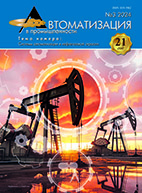Современные учёные не требуют чудес: они требуют экспериментов.

#12 2018
CONTENTS №12
Baulin E.S. Modern university: the cohesion of education, science, and business
Tavberidze T.A., Menn A.A., Dozortsev V.M., Sorkin L.R. Small-scale science intensive business in the Industry 4.0 era
The causes of the backwardness of domestic innovative small-size business are analyzed. The features of the organization and operation of Russian hi-tech startups are discussed. Examples of various small-size science intensive business types are cited.
Keywords: small-size science intensive business, innovations, funds, business angels, startups, Industry 4.0, digitalization of industrial processes, machine learning, Big Data.
Baulin E.S., Shunderyuk M.M. Combined educational and scientific research programs of the Moscow Institute of Physics and Technology (State University) and Honeywell JSC Russia: a major key to successful development of qualified industrial automation specialists
The paper reviews educational and scientific research programs of the Moscow Institute of Physics and Technology and the Russian office of Honeywell, a global industrial automation leader. The approaches to the implementation of combined programs and future challenges are discussed.
Keywords: innovative educational technology, education in the Industry 4.0 era, information systems, science intensive business.
Khokhlov A.S., Baulin E.S., Konnov A.I., Mishutin D.Yu. Integrated Planning Complex for vertically integrated oil companies
A variety of advanced planning and scheduling tasks and their interrelation with reference to vertically integrated oil companies are discussed. A proven approach to executing key planning and scheduling tasks for an oil company in the supply chain from oil-and-gas production department up to a gas station with the help of the Integrated Planning Complex is described. Generic requirements to successful implementation and operation of the Complex are formulated based on its twenty-year application experience.
Keywords: Integrated Planning Complex, scheduling, optimization, linear programming, simulation, efficiency improvement, RPMS, RSAND/GENET, implementation and maintenance of computing complex, vertically integrated oil company.
Khokhlov A.S., Baulin E.S., Borodin P.E., Boronin A.B. Optimization production planning models as an energy efficiency improvement tool
The paper discusses the application of procedures, models, and technologies aimed at energy efficiency improvement of oil refining and chemical plants. The authors describe their experience in the implementation of optimization models allowing under waving consumption conditions at LUKOIL JSC and its affiliates. Recommendations are made on improving the application efficiency of optimization planning models with variable energy consumption rates.
Keywords: energy management, optimization planning, LP models, energy efficiency improvement, RPMS, energy conservation.
Ellerington T., Power P., Shishorin Yu.R., Aksenova T.S. Russian oil refining industry: Towards performance excellence through benchmarking
The paper overviews benchmarking studies of Russian oil refineries as the first step in the performance excellence process. The studies have been conducted in Russia in the recent 20 years by Solomon Associates on the basis of their patented Comparative Performance AnalysisTM (CPATM) benchmarking technology and were supported locally by Moscow-based Honeywell JSC and its partner Digital Technology Center LLC. CPATM comprises patented comparative performance and gap analyses techniques. The paper outlines key Solomon competitiveness and efficiency indices. Russian refineries are compared against European competitors and world pacesetters in terms of energy intensity (Energy Intensity IndexTM, EII), plant availability (Operational Availability, OA), and maintenance efficiency (Maintenance Efficiency IndexTM, MEITM). The role of Honeywell and Digital Technology Center in Russian benchmarking is described. Then paper shows the growing operational efficiency and competitiveness of Russian fuel refineries as well as their still existing improvement gaps. It outlines further evolution and novelties of Solomon studies in Russia such as “automated studies” with Solomon Profile II software, custom and detailed studies of automation and control systems (including advanced process controls), reliability and maintenance studies, process unit studies, etc.
Keywords: Comparative Performance AnalysisTM (CPAT,M), competitiveness and efficiency indices, Energy Intensity IndexTM (EII), Operational Availability (OA), Maintenance Efficiency Index (MEITM), fuel refinery, consulting, PEPTM, reliability and maintenance (RAM), benchmarking study support.
Shishorin Yu.R., Tsodikov Yu.M., Mostovoy N.V., Aksenova T.S. Optimization modeling in long-range planning of oil refining and petrochemical plants
The paper discusses optimization modeling in the automation of top-level planning, such as long-range planning at oil refining and petrochemical plants. Long-range planning models are examined, the opportunity of their development on the basis of routine planning models. Examples of optimization models application for creating production development strategies and programs are cited.
Keywords: long-term planning, interrelation of planning and control tasks, automation of oil refining planning tasks, long-term development programs, LP modeling, optimization modeling, process development models, nonlinear optimization models, investment appraisal, financial and economic models, benchmarking studies, information technologies.
Gorodnova M.V., Khokhlov A.S. Simulation approach to oil refining scheduling
Application of simulation approach to production process scheduling in oil refining is examined. SKARD scheduling system developed by the authors for automatic generation of production simulation models is described. The system enables the automation of scheduling and timetabling process.
Keywords: oil refining, scheduling, timetabling, simulation modeling.
Konnov A.I., Khokhlov A.S., Gorodnova M.V. Data integration in production planning systems
A data integration problem is formulated. The data come from various planning and accounting systems and are used for planning at different production areas. Data structures, integration and reconciliation algorithms are described. The paper shows that the reconciliation task can be reduced to an LP problem.
Keywords: scheduling, continuous process, oil refinery, data-flow graph, integration of planning systems.
Novichkov A.Yu., Ivanovsky V.A., Baulin E.S. On the practical application of panoramic interfaces in industry
The paper discusses the application of virtual tour (VT) technology in industry. It analyzes specific requirements to VT for industrial plants as against end-user applications. Key implementation phases of an industrial panoramic interface are outlined, an application example is cited. Basic industrial VT development trends are formulated.
Keywords: virtual tours, panoramic interfaces, photo panorama, HDR technologies.
Budenniy S.A., Bukharev A.Yu., Volkov N.A., Tsanda A.P., Margarit A.S., Andrianova A.M., Belozerov B.V. New approaches in the analysis of geologic-geophysical information based on machine learning techniques
Application examples of state-of-the-art machine learning-based approaches to geologic-geophysical information analysis are discussed. A statistical method for the PVT properties analysis of reservoir fluids is offered. The method is based on the mix of multidimensional Student distributions. It allows to reveal potentially abnormal sample and selects the best value from a set of available analogs. In the well logging task, an approach to the validation of geophysical research data is offered using an independent expert system trained on the results of earlier interpreted borehole studies. In particular, such expert system can be used when a collector in a specific geological cross-section cannot be determined unambiguously on the basis of GIS data. The processing of digital images of thin section of terrigenous rocks gives another example of a drastically new approach to automatic processing of geologic-geophysical information. It is aimed at automatic segmentation of structural objects based on a hybrid approach combining spectral image processing techniques and convolutional neural networks. It enables fast (image processing takes one through sixty seconds) acquisition of morphological data about clastic grains of terrigenous rocks and thus exempts experts from routine functions and allows them to focus on more sophisticated tasks requiring unique expert knowledge.
Keywords: PVT, GIS, thin sections, machine learning. data analysis, expert system.
Последний вышедший номер
Адрес редакции: 117997, Москва, Профсоюзная ул., д. 65, оф. 360
Телефон: (926) 212-60-97.
E-mail: info@avtprom.ru или avtprom@ipu.ru
© ООО Издательский дом "ИнфоАвтоматизация", 2003-2024 гг.

